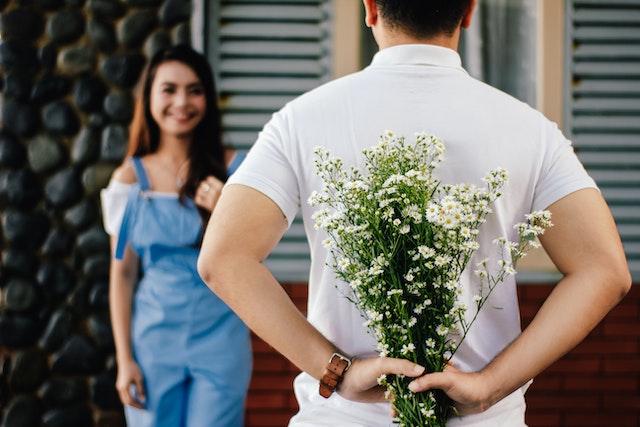Learn the most used Korean phrases in Korean dramas! Korean TV shows have taken the world by storm, captivating audiences with its unique blend of drama, humor, and emotion. If you’re a fan of Korean TV shows or just beginning to explore this vibrant world of entertainment, you’ve likely encountered some common phrases in Korean dramas that add depth and authenticity to the storytelling. In this blog post, we’ll delve into these phrases, shedding light on their meanings and usage, so you can fully appreciate the magic of Korean television.
Most used Korean phrases in Korean dramas

Mianhae (미안해) or Mian (미안)
I’m Sorry
Conflict and misunderstandings are staples of dramatic storytelling, and “mianhae” often comes into play when characters need to apologize. This phrase showcases the characters’ humility and willingness to make amends. While you mentioned “mianhae” for “I’m sorry,” “mian” is a shorter and less formal version of the same phrase. It’s used casually among friends or in less serious situations.
Gomawo (고마워) – Thank You
At the heart of this act of appreciation lies a simple yet profound phrase, “gomawo” (고마워). This phrase, with its deep-rooted cultural significance, is the go-to choice when characters on Korean TV shows seek to convey their heartfelt thanks, and its presence in the narrative landscape adds layers of warmth and genuineness to their interactions. Whether it’s a grand gesture of thanks or a subtle acknowledgment of kindness, “gomawo” is the conduit through which characters bridge emotional gaps, forging connections that resonate with viewers on a personal level.
Gwaenchana (괜찮아)
It’s Okay
In moments of reassurance or comfort, characters often say “gwaenchana” to let others know that everything will be fine. This phrase is frequently used to soothe and support one another during difficult times. The beauty of “gwaenchana” lies not only in its linguistic elegance but in its inherent power to bridge emotional chasms. It is a declaration of empathy, a whispered promise that resonates with viewers on a visceral level.
Saranghae (사랑해)
I Love You
Love is a central theme in many Korean dramas, and “saranghae” is the phrase that encapsulates those profound emotions. Whether it’s between romantic partners, family members, or friends, the declaration of love adds depth to the storyline.
좋아해 (Joh-ah-hae)
I Like You
“좋아해” is an affectionate and intimate phrase in Korean that translates to “I like you” or “I love you” depending on the context. It is a verbal expression of romantic affection, fondness, or love towards someone. The meaning of “좋아해” encompasses the idea of having strong positive feelings and admiration for another person.
“좋아해” is most commonly used to express romantic feelings towards someone. It is often employed when an individual wants to confess their affection or love for someone they are romantically interested in. For example, someone might say, “너를 정말 좋아해” (Neo-reul jeongmal joh-ah-hae), which translates to “I really like/love you.
In addition to romantic love, “좋아해” can also be used to express deep fondness or admiration for someone or something. For instance, you can say “이 음악을 좋아해” (I eumak-eul joh-ah-hae), meaning “I like this music” or “I’m fond of this music.”

Jjang (짱)
The Best
In moments of triumph or when acknowledging someone’s excellence, you’ll often hear the word “jjang.” It’s an informal expression of praise and enthusiasm, making characters’ victories all the more satisfying.
“짱” is a positive and enthusiastic word that signifies excellence and enthusiasm, making it a versatile expression for various situations where you want to express approval, excitement, or admiration for someone or something exceptional.
It can be used like the below
Applauding an Outstanding Performance:
“오늘 공연은 짱이었어!” (Oneul gong-yeon-eun jjang-i-eosseo!) Translation: Today’s performance was the best!
Praising a Delicious Meal:
“이 음식은 짱 맛있어!” (I eum-sik-eun jjang ma-sit-eo!) Translation: This food is incredibly delicious!
Cheering for a Favorite Sports Team:
“우리 팀 짱이다!” (Uri tim jjang-i-da!) Translation: Our team is the best!
Daebak (대박)
Awesome
Similar to “jjang,” “daebak” is another expression of excitement and approval. It’s often used when characters encounter something surprising, impressive, or astonishing.
“대박” is a vibrant and enthusiastic word that conveys a sense of amazement and delight. It’s used to express excitement and admiration for something that is truly remarkable or fantastic.
Reacting to Good News:
“대박, 너가 그 일을 성공했어!” (Daebak, neo-ga geu il-eul seong-gong-haess-eo!) Translation: Awesome, you succeeded in that task!
Celebrating a Success:
“시험에서 만점을 받았어, 대박!” (Si-heom-e-seo man-jeom-eul bad-ass-eo, daebak!) Translation: I got a perfect score on the test, awesome!
Reacting to an Impressive Achievement:
“당신의 성과는 대박이에요!” (Dang-sin-ui seong-gwa-neun daebak-i-e-yo!) Translation: Your achievement is awesome!
Daedanhae (대단해) – Phrases in Korean Dramas
Impressive
When characters are genuinely impressed by someone’s skills, achievements, or talents, they may use “daedanhae” to convey their admiration.
Jalsaenggin (잘생긴)
Handsome/Beautiful
Compliments play a significant role in Korean TV shows, and “jalsaenggin” is used to describe someone as good-looking. It’s a common phrase when characters are appreciating each other’s appearances.
“잘생긴” is a positive and flattering word used to praise someone’s physical appearance, and it can be applied to both males and females. It’s a common compliment used in Korean to show admiration for someone’s attractiveness. It is usually used for describing good-looking man rather than woman.
Referring to a Handsome Celebrity:
“그 배우는 한국에서 유명한 잘생긴 배우에요.” (Geu bae-u-neun han-guk-e-seo yu-myeong-han jalsaeng-gin bae-u-e-yo.) *Translation: That actor is a famous handsome actor in Korea.
Complimenting a Child:
“너의 아이는 정말 잘생겼어요.” (Neo-eui a-i-neun jeong-mal jalsaeng-gyeo-sseo-yo.) *Translation: Your child is really cute (for a child)!
Complimenting a Friend:
“너 정말 잘생겼어!” (Neo jeong-mal jalsaeng-gyeo-sseo!) *Translation: You’re really handsome (for a male)!
Exclamations in Korean – Phrases in Korean Dramas

eo-meo (어머)
Oh My Gosh
For moments of shock or surprise, “eo-meo” is the exclamation that perfectly captures the characters’ reactions. It’s a versatile expression used in a wide range of situations.
Aigoo (아이구)
Oh Dear
“Aigoo” is a gentle expression of sympathy or exasperation. Characters use it when they encounter a situation that calls for understanding or when they’re feeling overwhelmed.
Aigo (아이고)
Oh No
Similar to “aigoo,” “aigo” is an expression of sympathy or dismay. Characters use it when they encounter an unfortunate situation or when they’re frustrated with a turn of events.
Jinjja? (진짜?) – Phrases in Korean Dramas
Really?
In moments of disbelief or when characters want to confirm the truth, “jinjja” is the question that often arises. It’s a straightforward way to seek clarification.
Cheering up- Phrases in Korean Dramas
Hwaiting! (화이팅!)- Phrases in Korean Dramas
You Can Do It!
This motivational cheer is often heard in Korean TV dramas during crucial moments when characters need encouragement. It’s a powerful phrase that boosts confidence and determination.
“화이팅!” is a positive and motivating word that encourages and uplifts individuals, reminding them of their inner strength and capability to overcome challenges and achieve their goals.
Before an Exam:
“시험 잘 보고 와, 화이팅!” (Si-heom jal bo-go wa, hwaiting!) Translation: Do well on the exam and come back, you can do it!
Supporting a Team Member:
“우리 팀은 이 경기에서 승리할 거야, 화이팅!” (Uri tim-eun i gyeong-gi-e-seo seung-li-hal geo-ya, hwaiting!) Translation: Our team will win this game, you can do it!
Motivating Someone to Pursue Their Goals:
“너의 꿈을 이룰 수 있어, 화이팅!” (Neo-ui kkum-eul i-rul su iss-eo, hwaiting!) Translation: You can achieve your dreams, keep going, you can do it!
Encouraging a Friend to Overcome Challenges:
“이 어려운 시간을 꼭 극복할 수 있어, 화이팅!” (I eo-ryeoun shi-gan-eul kkok geuk-bok-hal su iss-eo, hwaiting!) Translation: You can definitely overcome this difficult time, keep fighting, you can do it!
Boosting Confidence Before a Performance:
“무대 위에서 너는 빛날 거야, 화이팅!” (Mu-dae wi-e-seo neo-neun bich-nal geo-ya, hwaiting!) Translation: You will shine on stage, you can do it!
Phrases in Korean Dramas and TV shows
Da-eum (다음)
Next Time
In Korean variety shows or competitions, you’ll often hear the phrase “daeum” as a way to encourage someone to do better next time. It’s a positive and motivating expression.
hwak-sil-hi (확실히)
Definitely
This is a versatile and common word for expressing certainty. It can be used in various situations and is suitable for both formal and informal contexts.
Making a Firm Promise:
“나는 이 일을 확실히 해내겠어.” (Na-neun i il-eul hwak-sil-hi hae-nae-ge-sseo.) *Translation: I will definitely succeed in this task.
Emphasizing an Important Point:
“이 해결책을 확실히 기억해야 해.” (I hae-gyeol-chaek-eul hwak-sil-hi gi-eok-hae-ya hae.) *Translation: You must definitely remember this solution.
Asserting the Truth:
“그 사실은 확실히 맞아.” (Geu sa-sil-eun hwak-sil-hi ma-ja.) *Translation: That fact is definitely correct.
Alternatively, ban-deu-si (반드시) can be used:
this word often conveys a sense of necessity along with certainty. It’s used to express that something is absolutely required or certain to happen.
Expressing a Requirement:
“여권은 출국 전에 반드시 확인해야 합니다.” (Ye-gwon-eun chul-guk jeon-e ban-deu-si hwa-gyeom-hae-ya ham-ni-da.) *Translation: You must absolutely check your passport before leaving the country.
Another alternative is kkok (꼭):
While “꼭” can mean “surely” or “definitely,” it’s often used in situations where you want to emphasize that something is absolutely necessary or bound to happen.
Expressing Necessity:
“이 문제는 꼭 해결해야 해.” (I mun-je-neun kkok hae-gyeol-hae-ya hae.) *Translation: You must definitely solve this problem.
Making a Firm Request:
“내 생일날 꼭 와 줘.” (Nae saeng-il-nal kkok wa jwo.) *Translation: Please do come on my birthday.
Uri (우리) – Phrases in Korean Dramas
We/Us
The term “uri” is frequently used to refer to “we” or “us” and emphasizes a sense of togetherness or group identity. It’s often employed when characters are bonding or collaborating.
Yeogi (여기)
Here
When characters want to indicate a location or direct someone to a specific place, they often use “yeogi.” It’s a practical phrase for setting scenes in TV shows.

Korean TV shows offer a rich cultural tapestry, and these common phrases are woven into the fabric of storytelling, adding authenticity and relatability to the characters and their experiences. As you continue to enjoy the captivating world of Korean television, keep an ear out for these phrases, and you’ll find yourself connecting even more deeply with the characters and their journeys.
Happy watching and thank you for reading 🙂
If you want to check out my other post about how to say coffee in Korean, please click here or the below links!